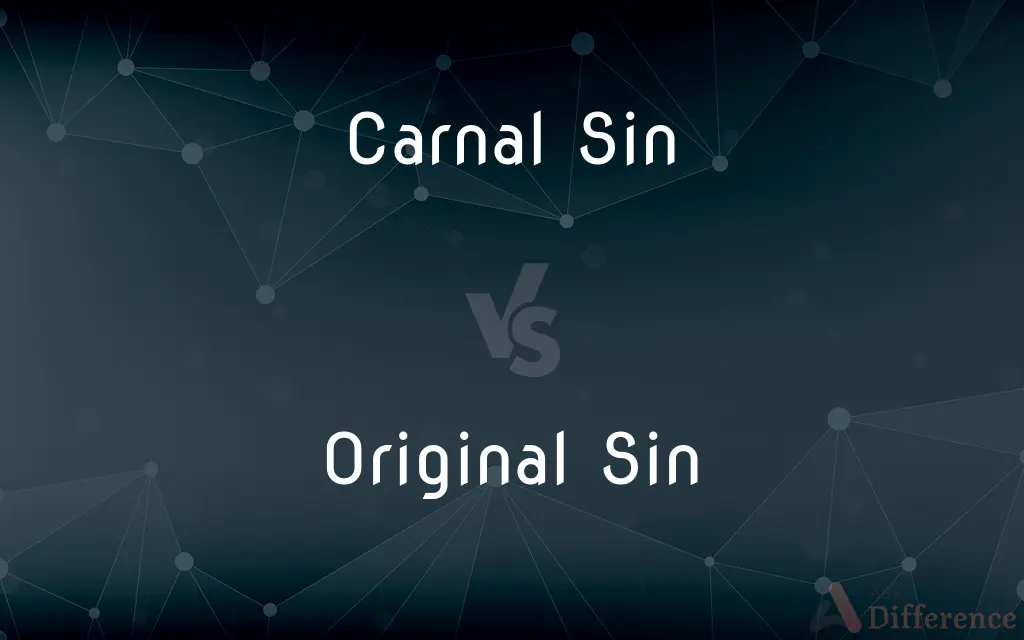Carnal Sin vs. Original Sin — What's the Difference?
By Tayyaba Rehman — Published on November 22, 2023
"Carnal Sin" pertains to sins of a sexual nature, stemming from bodily desires, whereas "Original Sin" refers to the innate sinful nature humans inherit due to Adam and Eve's transgression.

Difference Between Carnal Sin and Original Sin
Table of Contents
ADVERTISEMENT
Key Differences
"Carnal Sin" is a concept rooted in religious teachings, specifically emphasizing sins arising from bodily or fleshly desires, mainly of a sexual nature. In contrast, "Original Sin" denotes the sinful state into which every human is born, a consequence of Adam and Eve's first disobedience in the Garden of Eden.
While "Carnal Sin" addresses specific actions or behaviors driven by physical desires, "Original Sin" concerns the inherent sinful condition of humanity. This means every person inherits "Original Sin" simply by being born, whereas "Carnal Sin" is committed during one's lifetime.
"Carnal Sin" is often associated with the failure to resist temptation, especially regarding sexual immorality. On the other hand, "Original Sin" speaks to a deeper, foundational belief in Christian theology about humanity's inherent inclination towards sin, stemming from the very origins of human existence.
In Christian sacraments, baptism is believed to cleanse the soul from "Original Sin," symbolizing spiritual rebirth. However, "Carnal Sin" would require repentance and seeking forgiveness through prayer, confession, or other acts of penance, as it's a sin committed post-baptism.
Essentially, while both "Carnal Sin" and "Original Sin" revolve around human imperfection and deviation from divine commandments, they differ in origin, nature, and the ways they manifest in human life.
ADVERTISEMENT
Comparison Chart
Nature
Sin of a sexual or bodily nature
Innate sinful state every human inherits
Origin
Committed during one's life
Result of Adam and Eve's disobedience
Relation to Baptism
Requires repentance post-baptism
Cleansed through baptism
Connection to Temptation
Failure to resist specific temptations
Inherent inclination towards sin
Implications
Concerns individual actions or behaviors
Concerns the collective nature of humanity
Compare with Definitions
Carnal Sin
A sin resulting from bodily desires.
He repented for his carnal sin after a moment of weakness.
Original Sin
The natural state of sin into which humans are born.
The concept of original sin underpins many Christian beliefs about redemption.
Carnal Sin
A deviation from divine commandments driven by physical urges.
The community emphasized purity to prevent falling into carnal sin.
Original Sin
The foundational human flaw as per Christian theology.
Discussions on human nature often touch upon the topic of original sin.
Carnal Sin
A transgression rooted in physical lust.
Many seek spiritual guidance to overcome carnal sin.
Original Sin
The innate sinfulness inherited by all humans.
The doctrine of original sin explains humanity's inherent imperfection.
Carnal Sin
An immoral act based on fleshly appetites.
The teachings warn against the dangers of succumbing to carnal sin.
Original Sin
The result of Adam and Eve's disobedience.
Baptism in Christianity symbolizes cleansing from original sin.
Carnal Sin
A sin stemming from human sensuality.
Ascetics often practice self-denial to avoid carnal sin.
Original Sin
The collective guilt inherited from the first humans.
The story of Adam and Eve introduces the idea of original sin in biblical texts.
Common Curiosities
Is "Carnal Sin" always of a sexual nature?
Primarily, but it can also refer to sins stemming from other bodily desires.
Does everyone inherit "Original Sin"?
According to Christian theology, every human inherits "Original Sin" due to Adam and Eve's transgression.
Can other sacraments besides baptism address "Original Sin"?
Baptism is the primary sacrament for cleansing "Original Sin," though other sacraments can nurture one's spiritual life.
Why is "Original Sin" called "original"?
It refers to the first sin by Adam and Eve, making it the "original" sin that affected humanity.
Is "Original Sin" unique to Christianity?
The specific concept of "Original Sin" is primarily Christian, though other religions might have similar notions of inherent human flaws.
Can one be forgiven for "Carnal Sin"?
Yes, through repentance and seeking forgiveness in ways prescribed by one's faith.
Does baptism remove "Carnal Sin"?
Baptism in Christianity symbolizes cleansing from "Original Sin." "Carnal Sin," being committed post-baptism, requires separate acts of repentance.
Is every human act of wrongdoing a "Carnal Sin"?
No, only those specifically arising from bodily desires are deemed "Carnal Sin."
How is "Original Sin" passed down?
It's seen as an inherent state all humans are born into due to Adam and Eve's disobedience.
How does one commit "Carnal Sin"?
By engaging in actions or behaviors driven by bodily or fleshly desires, especially sexual ones.
Are there degrees of "Carnal Sin"?
While some faith traditions might categorize sins, the gravity of "Carnal Sin" can vary based on context and beliefs.
Share Your Discovery

Previous Comparison
Sit-ups vs. Squats
Next Comparison
Amantran vs. NimantranAuthor Spotlight
Written by
Tayyaba RehmanTayyaba Rehman is a distinguished writer, currently serving as a primary contributor to askdifference.com. As a researcher in semantics and etymology, Tayyaba's passion for the complexity of languages and their distinctions has found a perfect home on the platform. Tayyaba delves into the intricacies of language, distinguishing between commonly confused words and phrases, thereby providing clarity for readers worldwide.












































